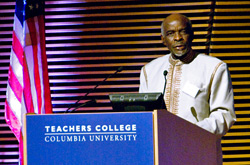Filed Under > International
A Worthwhile Journey: The Story of Namibian Prime Minster Nahas Angula
“Nahas Angula, thanks to your efforts, Namibia has educated a generation of your countrymen and women and emerged as one of Africa’s most stable and democratically-oriented nations,” TC Provost Tom James intoned, reading from the citation prepared in the Prime Minister’s honor. “At Teachers College we pride ourselves on producing graduates who carry forth our values; who exponentially increase our positive impact; and who, in turn, educate us through their own experiences and enhanced perspectives. You have done all of these things on a scale few can match.”
Angula then described his own years in exile, first in Zambia and then New York City, and his subsequent triumphant quest, as Namibia’s first Minister of Education, to build a modern, racially integrated education system across a nation equal in size to Texas and California combined, serving a populace that speaks Bantu, Ovambu, German, Portuguese, Dutch, French and Chinese.
“”When I enrolled at TC in 1976, I was thinking of two key education questions,” he recounted. “How can knowledge be better arranged to meet the needs of all learners? And can teaching be better arranged for the same purpose?
“Why did I care about those two questions? Because I had founded a school for Namibian exile children in 1973 in Zambia. I was the teacher, curriculum designer, materials provider and principal of that school. So I had to grapple with those two questions, and I was determined to find answers.”
Many aspects of that school’s curriculum were incorporated into Namibia’s national education program when Angula became Education Minister in November 1990. His first directive in that post outlawed racial and ethnic segregation of Namibia’s schools, established a National Institute of Education Development and appointed a Commission on the Democratization of Higher Education. Angula subsequently set national goals of equity access to education, improved efficiency and quality of education, and lifelong learning. He deployed low-cost technologies, including the radio and cell phones, to bridge Namibia’s vast distances. Today, the country spends in excess of 5 percent of its Gross Domestic Product on education, maintains compulsory education for all children up to age 16 through a system organized along the lines of American public school districts, and also operates colleges of education.
“Today is a celebration of the victory of the Namibian people over apartheid and colonialization,” Angula told his listeners in Cowin Center. “When three friends and I went into exile in 1968, I never suspected that one day I shall make a difference in the lives of others through education. Mine was a life journey full of trials and tribulations, tragedies and misfortunes, adventures and misadventures, and I’m grateful that it has been a worthwhile journey.”
Click here to view video.
Published Thursday, Apr. 29, 2010
